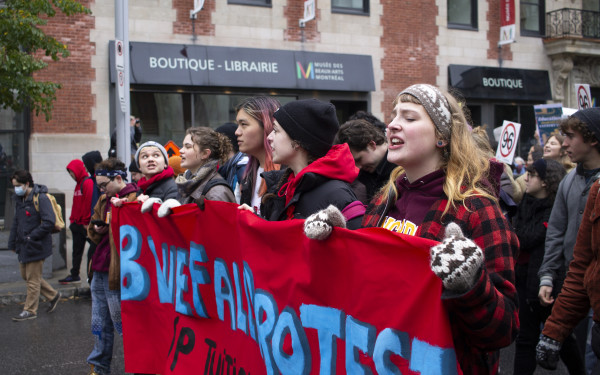“Au revoir monsieur Legault!”: Students protest tuition increase
Quebec English university students unite in a march against the latest language discrimination law
Announced on Oct. 13, Quebec Minister of Higher Education Pascale Déry confirmed that tuition prices for new out-of-province Canadian students will double in the coming year, increasing to around $17,000 a year whereas international student fees will rise to a minimum of $20,000 a year.
In response to the recent announcement, Concordia, McGill, and Bishop’s University students organized a joint strike protesting the tuition increase. The demonstration took place on Oct. 30 at Dorchester Square, marched past Concordia and ended at the McGill Roddick Gates.
President of the task force on linguistic policy Andrew Caddell attended the protest. “We are collaborating with the students who are leading this because we feel that there is a severe wrong being imposed on students who come from outside of Quebec.”
Caddell predicts that raising tuition prices will discourage students from coming to Quebec, causing Montreal to millions of dollars in investments that students from outside of Montreal bring in.
He also stated that these efforts made by the Quebec government intend to diminish the English language from Montreal. “That's what their objective is. They've said that quite clearly. Their degree of discrimination is so transparent now. They're very bold about it.”
In June of this year, CBC Montreal reported that Minister of the French Language Simon Jolin-Barrette stated, “Quebec is one of the most open and welcoming societies in the world, but in Quebec we must welcome people who migrate here in French.”
That, however, is not the case. Many French-speaking communities outside of Quebec do not have access to affordable tuition fees in this province. However, French and Belgian students are provided with the extremely affordable Quebec fees. African French-speaking countries, on the other hand, are required to pay international fees.
Hostility towards anglophones has existed in Quebec for decades. Concordia student, Jane Dennis, held up a sign that read “My father was one of the 300,000 you exiled. You won't take me.”
Dennis said that her father lived in Quebec in the 1970s but had to evacuate due to the October Crisis—a series of kidnappings and bombings that occurred in Quebec led by the Front de Libération du Québec, a “radical and separatist group.”
“It was too hostile for him and his family,” Dennis said. “They were trying to exile the Anglos. There was nowhere for them to work and they felt unsafe in their community.”
Despite her family’s history in Quebec, Dennis still chose to live in Montreal. “I love living here. I think it's a great place to be. I don't think that I should not be able to live here just because I'm not francophone. I should be able to study here,” she said.
However, Dennis does feel hostility being an anglophone in the city. “I feel afraid that I can't live here affordably. It is difficult to live here as an Anglo.”
The recent Coalition Avenir Québec plans might also affect university departments. Nat Roy, another out-of-province Concordia student, said her liberal arts program might diminish due to the tuition increase, “There's only 250 students in the program at Concordia liberal arts. A third of us are from out of province. If we lose a third of that money, there's not going to be enough students to keep the funding in the program going.” These claims were also echoed by Jarrett Carty, the liberal arts chair at Concordia.
Through chants and signs, protesters all shared the common belief that increasing tuition for out-of-province students will heighten the inaccessibility of education.
Jedha McMullen, a McGill student from Alberta, said, “I believe in accessibility of education, not just for those who can afford it. I just don't believe it's fair to kids who have earned their place to go here and who would benefit the community of, not just Montreal, but Quebec at large.”
McMullen fears her younger siblings will not be afforded the same opportunities as her, “Being accepted here was an incredible opportunity,” she said. “I have three siblings who would have liked to go to McGill, and they might not get the chance to do that.”
McMullen described Montreal as an “incredibly diverse city. That is one of the things that I’m afraid will suffer, the people that choose to come here.”
The institution that would perhaps be in the most precarious position is Bishop's university. According to the university’s website, 31 per cent of Bishop’s students are out-of-province, 19 per cent international students, and 50 per cent from Quebec.
Vanessa Samudio, a Bishop’s University student, stood alongside her peers to support them. Despite not facing the tuition increase herself, Samudio said, “I'm here in support of those that want to come [to Quebec] because I love my university and I would hate to see it go down like this.”
Samudio said that the university could possibly shut down due to a loss of students or even become a French institution.







